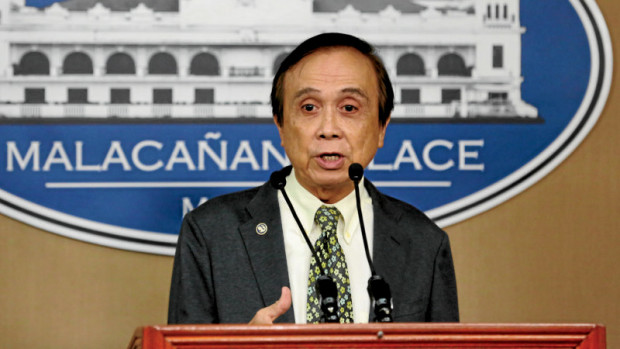
Socioeconomic Planning Secretary Ernesto M. Pernia. JOAN BONDOC / INQUIRER FILE PHOTO)
Socioeconomic Planning Secretary Ernesto Pernia on Thursday downplayed concerns that extending martial law in Mindanao until December would adversely affect the economy.
Pernia, head of the National Economic and Development Authority (Neda), said it was “probable” that the country’s gross domestic product (GDP) this year would grow “more than” the minimum government target of 6.5 percent.
“I was in Cagayan de Oro just the other day and there were businessmen there in the forum … and many of them said there [was] no problem,” Pernia said.
“Businesses are not being disrupted. In fact, they feel safer and more confident about the investment or business environment in Mindanao in general,” he said.
Pernia noted that the conflict area in Mindanao was only “limited” to Marawi City, which Maute and Abu Sayyaf terrorists had besieged, prompting President Duterte to impose martial law in Mindanao on May 23.
The President has asked Congress to extend martial law until Dec. 31, since the battle for Marawi is expected to continue well beyond the 60-day period prescribed in the Constitution for the emergency. This expires on Saturday.
Concerns have been raised that prolonging martial law would have a negative economic impact, particularly on tourism and the country’s investment climate.
However, Pernia said the country was on its way to achieving its GDP growth target of at least 6.5 to 7.5 percent.
“In fact, it’s probable that we can exceed the lower end of our target,” he added.
The Asian Development Bank had raised the GDP outlook for Philippines from 6.4 percent to 6.5 percent in 2017 and from 6.6 percent to 6.7 percent in 2018.
Presidential spokesperson Ernesto Abella was also bullish, noting that the top regional economist of banking giant JP Morgan had pointed out that the Philippines had a unique opportunity—not seen since the mid-1990s—to put the country on a more equitable growth path.
“We are in a unique opportunity, a Goldilocks moment, and we expect this growth to become more robust, sustainable and inclusive,” Abella said.
Looking back at the administration’s first year in office, Pernia said the Neda board had approved 28 infrastructure projects worth P786 billion.
He said these projects included the 102-kilometer commuter railway from Tagum City in Davao del Norte to Digos City in Davao del Sur, the expansion and improvement of Clark International Airport, and the construction of a commuter line and an express train between Manila and Clark.